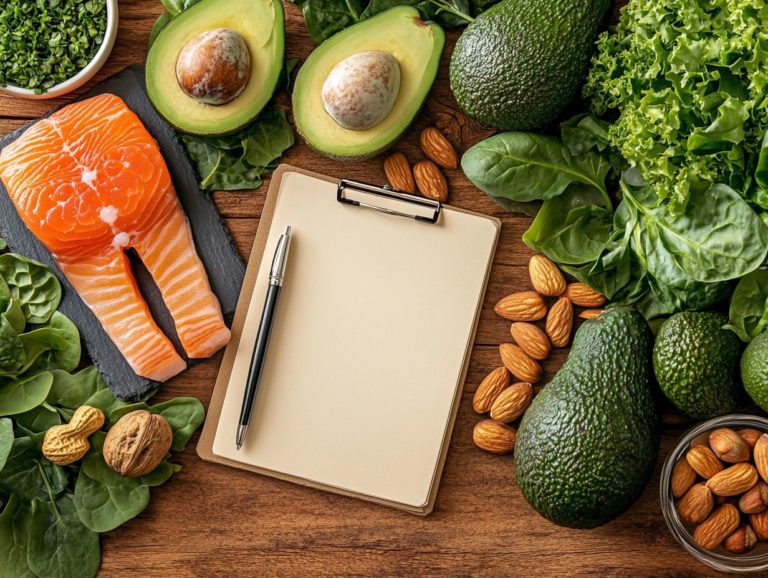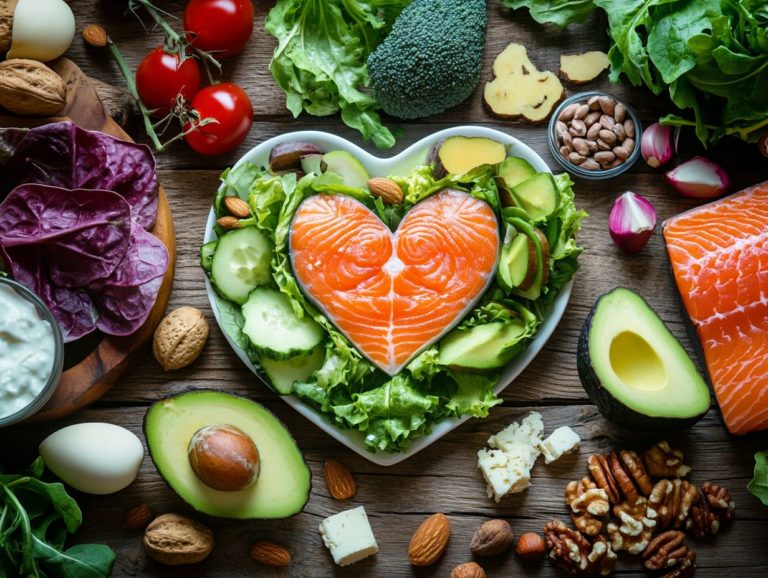What are Common Mistakes on Keto? Your Questions
The Keto diet has emerged as a highly regarded method for losing weight and enhancing health benefits. But what is it really, and how does it function? This article delves into the core principles of the Keto diet, outlining its benefits and highlighting common keto mistakes to steer clear of.
You ll uncover practical tips to maximize your Keto journey, including tempting snack ideas, meal prepping advice, and effective strategies to navigate the notorious Keto flu. Whether you re just starting out or seeking to fine-tune your approach, this guide offers valuable insights for everyone.
Contents
- Key Takeaways:
- What is the Keto Diet?
- How Does the Keto Diet Work?
- What Are the Benefits of the Keto Diet?
- 1. Weight Loss
- 2. Improved Blood Sugar Control
- 3. Increased Energy Levels
- 4. Reduced Inflammation
- What Are the Common Mistakes on the Keto Diet?
- 1. Not Tracking Macros
- What Are Some Keto-Friendly Snack Options?
- How Can You Avoid the Keto Flu?
- Frequently Asked Questions
- What are Common Mistakes on Keto?
- Is not tracking macronutrient intake a common mistake on keto?
- Why is it important to eat enough vegetables on keto?
- How can not staying hydrated affect the keto diet?
- Are you ready to master your keto journey?
- What are some tips for avoiding these common mistakes on keto?
Key Takeaways:

- Neglecting to track macros and eat enough vegetables can stall your weight loss and overall health.
- Consuming too many processed foods and not drinking enough water can also impede progress and lead to the Keto flu.
- To avoid the Keto flu, gradually reduce carb intake, increase water and electrolyte consumption, and prioritize healthy fat sources.
What is the Keto Diet?
The keto diet, which stands for ketogenic diet, is a carefully crafted low-carb, high-fat eating plan designed to help you reduce carbohydrate intake while boosting healthy fats and moderating your protein consumption. This low-carb plan emphasizes the importance of consuming high-quality foods and avoiding processed items.
The goal is to reach a metabolic state called ketosis. In ketosis, your body burns fat for fuel instead of relying on carbohydrates. This dietary approach has surged in popularity thanks to its potential health perks, especially for individuals looking to shed pounds or manage certain medical conditions, like diabetes and obesity.
As with any major dietary shift, it s essential to consult a healthcare provider before embarking on the keto journey, especially if you have any medical conditions such as diabetes, hypertension, or obesity.
How Does the Keto Diet Work?
The keto diet operates by significantly minimizing your carbohydrate intake, prompting your body to enter a state known as ketosis. In this state, your body becomes remarkably efficient at burning fat for energy rather than relying on glucose. This transition reduces your body’s glucose production and helps manage blood sugar levels.
As this transformation occurs, your insulin levels drop considerably. This can enhance insulin resistance and provide a range of health benefits, including weight loss and increased energy levels.
By embracing a diet abundant in healthy fats and moderating your protein intake, you can smoothly transition into this low-carb lifestyle. Ensure you meet your hydration needs and avoid nutrient deficiencies by consuming a variety of foods.
What Are the Benefits of the Keto Diet?
The keto diet offers exciting benefits that can change your life, especially for those in search of effective weight loss strategies and enhanced blood sugar regulation. Its low-carb framework can help you experience diminished cravings, elevated energy levels, and marked improvements in insulin sensitivity.
This makes it an appealing choice for anyone managing diabetes or striving to overcome obesity. It can also support better blood pressure management and reduce the risk of chronic diseases.
Furthermore, the anti-inflammatory properties of dietary fat may offer overall health enhancements that go beyond merely shedding pounds.
Don t wait to start your keto journey!
1. Weight Loss
One of the most compelling benefits of the keto diet lies in its remarkable ability to promote weight loss. By encouraging your body to burn stored fat for energy instead of relying on carbohydrates, this approach can transform your weight management journey.
When you significantly limit calorie intake from carbs, you’ll likely discover that you feel fuller for longer, thanks to the satiating nature of healthy fats. This not only helps curb cravings but also supports better portion control.
Pairing this diet with regular physical activity can lead to sustainable weight loss.
The process of ketosis, where your body transitions to using fat as its primary fuel, plays a vital role in appetite suppression. To effectively manage your calorie intake while following this diet, it s crucial to keep track of your food consumption and adhere to specific macronutrient ratios the balance of fats, proteins, and carbs in your diet. Incorporating fiber-rich, low-carb vegetables into your meals can further enhance satiety and stave off those pesky hunger pangs.
Staying active through regular exercise not only boosts your metabolism but also helps maintain muscle mass, which is essential during any weight loss journey. By balancing these elements, you create a comprehensive strategy for achieving long-term success.
2. Improved Blood Sugar Control
The keto diet has been shown to enhance your blood sugar control, making it especially advantageous if you re dealing with insulin resistance or diabetes. By cutting back on carbohydrates, you effectively reduce glucose production and stabilize your blood sugar levels.
This can lead to a decreased need for insulin and a marked improvement in your overall metabolic health. Managing diabetes and preventing related complications becomes much more attainable.
The magic lies in the body s transition from using glucose to relying on ketone bodies as its primary energy source. This shift not only lowers your blood glucose levels but also boosts your insulin sensitivity.
As your body settles into ketosis, you’ll likely experience fewer insulin spikes, making your health journey feel more manageable and empowering! With glycogen stores being tapped out, your liver shifts its focus to fat metabolism, offering the dual benefits of weight loss and enhanced blood sugar regulation.
For those navigating the challenges of type 2 diabetes, these transformations can significantly reduce the risk of erratic blood sugar levels, paving the way for a more stable and healthier life overall.
3. Increased Energy Levels
Many individuals on the keto diet experience a remarkable boost in energy levels as their bodies shift to relying on fat as the primary fuel source during ketosis. This transition from carbohydrates to dietary fats can lead to a more stable energy supply, allowing you to enjoy fewer energy crashes and improved stamina throughout your day.
By incorporating high-quality, healthy fats into your meals, such as creamy avocados, crunchy nuts, and omega-rich fatty fish, you can truly maximize your energy potential.
The process of entering ketosis encourages your body to burn fat more efficiently, converting it into ketones that energize both your physical and mental activities.
To fully optimize this energy source, it’s crucial to focus on incorporating fats that are not only calorie-dense but also rich in nutrients. Regular physical activity can further amplify these benefits by boosting your metabolism.
You can enhance your energy stability by balancing these fats with a moderate intake of protein while minimizing carbohydrates. This thoughtful selection helps maintain a steady release of energy, supporting your sustained vitality throughout the day.
4. Reduced Inflammation

The keto diet may play a pivotal role in reducing inflammation within your body. Inflammation is a key player in various chronic diseases like obesity and diabetes.
By emphasizing healthy fats, particularly omega-3 fatty acids, you can harness powerful anti-inflammatory benefits that support your overall health and well-being. As inflammation decreases, you might find that your recovery times improve and your health outcomes take a turn for the better.
These healthy fats, primarily sourced from fish, nuts, and select oils, are essential for modulating your body s inflammatory responses. Unlike saturated fats, which can worsen inflammation, the monounsaturated and polyunsaturated fats abundant in the keto diet are far more beneficial for maintaining optimal health. Omega-3 fatty acids, in particular, are known for their potent anti-inflammatory properties.
This shift towards incorporating beneficial fats into your diet could help alleviate symptoms of chronic conditions, reducing your risk of heart disease or metabolic syndrome. A diet rich in anti-inflammatory fats may also enhance cognitive function, providing added support for those concerned about neurodegenerative diseases.
This highlights the amazing benefits of embracing this diet! You can not only feel better but thrive in your daily life.
What Are the Common Mistakes on the Keto Diet?
As you embark on your keto diet journey, it’s crucial to be aware of the common pitfalls that could impede your progress and overall health. These mistakes often arise from a misunderstanding of the dietary principles.
- Not recognizing electrolyte imbalances
- Overlooking food quality
- Failing to keep track of your carbs, proteins, and vitamins
You might find yourself overlooking the quality of the foods you consume or neglecting to track your intake of carbs, proteins, and fats. Failing to address electrolyte imbalances can occur with a significant reduction of carbohydrates.
By recognizing these common missteps, you can skillfully navigate your keto experience and fully enjoy its numerous benefits.
1. Not Tracking Macros
One of the most critical mistakes you can make on the keto diet is failing to track your intake of carbs, proteins, and fats accurately. Without a proper accounting of these nutrients, maintaining the ideal ratios necessary to achieve and sustain ketosis becomes a daunting task.
This oversight can significantly hinder your weight loss journey and diminish the overall health benefits tied to the keto lifestyle. The importance of precise tracking cannot be overstated minor deviations can disrupt the delicate balance required to remain in ketosis.
By keeping a vigilant eye on your intake and reading food labels carefully, you can gain a clearer understanding of how different foods affect your body and metabolism. Leveraging tools such as mobile apps for tracking or meal-planning websites can make this process simpler and help you stay on top of your nutritional objectives effortlessly.
These tools can assist in managing your daily calories and ensuring your calorie intake aligns with your weight loss and health benefits goals. Keeping a food diary or using a kitchen scale to measure portions offers valuable insights into your daily consumption.
These methods promote accountability and foster a greater awareness of what a well-rounded keto meal truly looks like, including portion control and managing carbohydrates, protein intake, and fats.
2. Not Eating Enough Vegetables
One common mistake you might make is not incorporating enough non-starchy vegetables into your keto diet. This can lead to nutrient deficiencies and a lack of dietary fiber. While focusing on low-carb foods is essential, neglecting vegetables limits your intake of vital vitamins and minerals crucial for overall health.
By including a variety of colorful, low-carb vegetables, you can ensure that you maintain adequate nutrient levels while sticking to your keto plan. Non-starchy options, such as leafy greens, broccoli, and zucchini, are not only low in carbohydrates but also packed with fiber, which is essential for digestive health. Fiber plays a key role in regulating blood sugar levels and addressing insulin resistance, making it an important component of your keto diet.
These vegetables are rich in antioxidants and important nutrients like potassium and magnesium, which support metabolic function and help reduce the risk of chronic diseases such as diabetes, hypertension, and obesity. By prioritizing these nutrient-dense foods, you can enhance your overall well-being and make your keto journey more sustainable and balanced.
Start incorporating more vibrant veggies into your meals today for a healthier keto journey!
3. Consuming Too Many Processed Foods
Consuming too many processed foods is a common misstep for those embracing the keto diet. These items frequently harbor hidden sugars and unhealthy fats that can sabotage your weight loss journey and drain your energy! When you rely on convenient, packaged options instead of focusing on high-quality, whole foods, you may face cravings and subpar health outcomes.
It s crucial to emphasize food quality and select natural, unprocessed ingredients to thrive in your keto lifestyle. These processed choices can impede your weight loss efforts and negatively affect your energy levels and overall well-being.
Rather than grabbing pre-packaged meals or snacks, consider exploring whole food alternatives that are naturally rich in nutrients and fit a high-fat, low-carb regimen.
- Fresh vegetables
- Grass-fed meats
- Healthy fats from sources like avocados or olive oil
By implementing strategies such as meal prepping and meticulously reading food labels, you can maintain a sharp focus on food quality while fully reaping the benefits of the keto diet, including better energy levels and weight loss.
4. Not Drinking Enough Water
Many individuals following the keto diet tend to underestimate the significance of proper hydration, which can lead to dehydration and worsen any existing electrolyte imbalances. Maintaining adequate water intake is crucial for optimal bodily functions, especially as your body adapts to a low-carb diet.
Hydration is crucial because the keto diet can lead to increased water loss due to ketone production and lower insulin levels. Stay hydrated! Aim for at least 8 to 10 glasses of water daily to keep your body functioning at its best!
Keep an eye out for signs of dehydration, such as a dry mouth, fatigue, or dizziness, and consider consulting with a healthcare provider if symptoms persist. Incorporating electrolyte-rich foods like leafy greens, avocados, or bone broth can further aid in maintaining fluid balance, since electrolytes are vital for muscle and nerve function. Including foods high in sodium, potassium, and magnesium is essential.
Carrying a reusable water bottle with you can serve as a gentle nudge to drink more frequently throughout the day, making it easier for you to meet your hydration goals and enhance your overall well-being on this diet.
5. Not Getting Enough Electrolytes
Failing to get enough electrolytes is a common misstep for those following the keto diet. This often leads to what many refer to as the ‘keto flu’. As you reduce carbohydrate intake, your levels of essential electrolytes like magnesium, potassium, and sodium can drop. These minerals are vital for your body’s proper functioning.
Maintain a balanced intake of these electrolytes to help prevent discomfort and support your overall well-being during your transition into ketosis. This ensures that your body functions optimally on a low-carb plan.
This reduction can significantly affect your energy levels, muscle function, and hydration status. Therefore, it is crucial to monitor your electrolyte intake closely. Ketosis speeds up the excretion of these essential minerals, raising the risk of imbalances. These imbalances could result in muscle cramps, fatigue, or even more serious health issues such as electrolyte imbalances and medical conditions.
To ensure you re getting enough, consider incorporating foods rich in these electrolytes into your diet, such as leafy greens, avocados, and nuts. Utilizing electrolyte supplements can also be a smart move, especially in the early stages of your diet. Staying well-hydrated and keeping track of your electrolyte consumption will help mitigate risks and enhance your keto journey. Always consider consulting with a healthcare provider to tailor your ketogenic diet to your needs.
What Are Some Keto-Friendly Snack Options?

Discovering keto-friendly snack options may seem daunting, yet a wealth of delightful and nutritious choices awaits you, perfectly aligned with the principles of the keto diet. By incorporating snacks rich in healthy fats, low in carbohydrates, and brimming with essential nutrients, you can effectively maintain your energy levels and quell cravings between meals.
Embrace meal prepping and plan your snacks ahead of time to simplify your commitment to the keto lifestyle. This way, you can indulge without feeling deprived.
1. Hard-Boiled Eggs
Hard-boiled eggs serve as an exceptional snack choice for anyone following the keto diet. They boast a rich profile of protein and healthy fats while keeping carbohydrates at bay. This healthy snack is not only convenient and straightforward to prepare, but it also delivers essential vitamins and minerals that bolster your overall health.
By weaving hard-boiled eggs into your meal plan, you can enjoy a satisfying treat that curbs hunger between meals. Each egg packs approximately six grams of high-quality protein, crucial for maintaining muscle and promoting satiety. The yolks are treasure troves of nutrients like vitamin D and choline, both pivotal for metabolic health and aiding in glucose production.
To whip up hard-boiled eggs, simply simmer them in water for about 9-12 minutes. Then, cool them in an ice bath to ensure they are easy to peel. For maximum freshness, store them in the refrigerator, where they can remain delightful for up to a week. This makes them an ideal grab-and-go option for your busy lifestyle.
2. Avocado Slices
Avocado slices are an exceptional keto-friendly snack, brimming with healthy fats and nutrients that support your satiety and overall wellness. Packed with fiber and essential vitamins, avocados deliver numerous health benefits while keeping carbohydrates at bay, making them an ideal choice for anyone embracing the keto lifestyle.
Incorporating avocados into your daily meals can be both effortless and delightful. Spread them on high-fat, low-carb bread or toss them into salads to elevate both flavor and texture.
For a quick snack, pair avocado slices with some cheese or simply enjoy them with a dash of salt and pepper for a straightforward yet satisfying treat.
Avocados also shine in the form of guacamole, which pairs beautifully with a variety of dishes while adhering to keto guidelines. Their creamy texture adds luxurious richness and provides healthy monounsaturated fats and omega-3 fatty acids, promoting heart health and helping you maintain your energy levels throughout the day.
Start your keto journey today by trying these delicious snacks!
3. Cheese and Nut Combinations
A delightful combination of cheese and nuts serves as a satisfying and nutritious snack for those following the keto diet. This pairing offers a wonderful balance of healthy fats and protein while keeping your carbohydrate intake in check. Versatile and delicious, both cheese and nuts can be enjoyed in an array of forms and flavors, making them an exceptional choice for anyone committed to maintaining a keto lifestyle.
This balance also helps in managing insulin and glucose levels. Incorporating these ingredients into your diet can supercharge your nutritional intake. Cheese is a fantastic source of calcium and essential vitamins, while nuts deliver a wealth of nutrients, including fiber, magnesium, and antioxidants. Nuts also provide omega-3 fatty acids, which are essential for keeping your heart healthy and reducing inflammation.
When adhering to a keto diet, it s vital to manage portion sizes. A typical serving of cheese is around one ounce, while a quarter cup of nuts is recommended. This mindful approach helps ensure you don t exceed your daily carb limits. Proper management also balances your moderate protein and high fats intake, which is essential for the keto diet.
Get creative in the kitchen! Try pairing aged cheddar with almonds or goat cheese with walnuts for a taste sensation. Not only do these pairings add variety to your snacks, but they also cater to a range of taste preferences, keeping your keto journey exciting and delicious.
4. Keto Smoothie
A keto smoothie can be a delightful and nutritious way for you to enjoy a snack while balancing proteins, fats, and carbohydrates. By blending low-carb ingredients like leafy greens and avocados with healthy fats such as coconut oil or nut butter, you can create a satisfying smoothie that delivers essential nutrients without straying from your keto goals.
These smoothies are not just a treat for your taste buds; they also provide an excellent source of hydration, which is particularly important for anyone embracing a ketogenic lifestyle. With the right combination of ingredients, you can elevate your energy levels and ward off the fatigue that sometimes comes with low-carb diets. Tossing in a scoop of protein powder can enhance the feeling of fullness, while a sprinkle of chia seeds introduces fiber and omega-3 fatty acids into the mix.
For an extra burst of flavor, consider adding low-carb fruits like berries, which can give your drink a refreshing twist without pushing your carb count over the edge. All in all, these well-balanced keto smoothies can become your energizing companion during those busy days.
How Can You Avoid the Keto Flu?
The term ‘keto flu’ refers to the flu-like symptoms some people experience as their bodies adjust to a low-carb diet, but there are effective strategies at your disposal to alleviate this discomfort.
To sidestep the keto flu, it s crucial for you to prioritize hydration, ensure you re getting enough electrolytes, and implement dietary changes gradually. By paying attention to these key factors, you can smooth your transition into the keto lifestyle and fully embrace its numerous benefits.
1. Increase Water and Electrolyte Intake
Increasing your water and electrolyte intake is essential for preventing the keto flu and easing its unwelcome symptoms, such as fatigue, headaches, and digestive discomfort. By ensuring you stay adequately hydrated and replenish vital electrolytes like sodium, potassium, and magnesium, you can support your overall health and well-being as you transition into a keto lifestyle.
To effectively boost your intake, aim for at least 3-4 liters of water each day, adjusting this amount according to your activity levels and the climate you re in. Foods like avocados, spinach, and salmon are fantastic sources of potassium and magnesium. Don’t forget to sprinkle a bit of salt on your meals to enhance your sodium intake. Incorporating bone broth not only helps with hydration but also enriches your diet with those essential electrolytes.
You might also consider keto-friendly electrolyte supplements, especially in the initial stages of your diet, to ensure balanced levels and keep those pesky symptoms at bay. Start implementing these strategies today and feel your best on your keto journey!
2. Gradually Reduce Carb Intake

Gradually reducing your carbohydrate intake is a smart way to ease into the keto diet. This allows your body to adjust without experiencing the dreaded keto flu.
By tapering off carbs over a few days or weeks, you can minimize fluctuations in glucose production. This helps your system adjust more comfortably to a lower-carbohydrate lifestyle.
This method not only reduces potential side effects but also encourages better long-term adherence to the diet. To implement this strategy effectively, start by identifying high-carb foods in your meals and systematically replacing them with lower-carb alternatives.
Incorporating more leafy greens, nuts, and healthy fats can keep your energy levels stable while enhancing feelings of fullness. Tracking your daily carbohydrate intake can provide valuable insights into your eating habits.
As your body adapts, get ready to feel energized, experience improved mental clarity, and notice reduced cravings. These benefits will reinforce your commitment to the keto lifestyle.
3. Consume More Healthy Fats
Consuming more healthy fats is essential for alleviating keto flu symptoms. These fats serve as your primary energy source during ketosis.
Incorporating a variety of healthy fats like avocados, nuts, and olive oil can support your energy levels and enhance your overall well-being. However, this shift can be challenging, often leading to fatigue, headaches, and irritability.
Healthy fats not only provide the necessary fuel but also maintain balanced hormone levels, which is crucial during this dietary transformation. When selecting fats, prioritize sources rich in omega-3 fatty acids, such as salmon and flaxseeds, as they help reduce inflammation.
Incorporating grass-fed butter and coconut oil elevates flavor and boosts health benefits. This makes your meals enjoyable while enhancing nutrient absorption.
To ease into this new dietary regime, gradually increase your fat intake alongside adjustments to your protein and carbohydrate consumption.
4. Get Enough Sleep and Manage Stress
Getting enough sleep and managing stress are essential elements influencing the severity of keto flu. When you skimp on sleep and let stress soar, you may find symptoms like fatigue and irritability intensifying.
Prioritizing good sleep and embracing stress-reduction techniques can support your well-being during this dietary shift. Establishing a consistent sleep schedule and crafting a calming bedtime routine can greatly enhance your sleep quality.
Techniques like mindfulness meditation, deep breathing exercises, and gentle physical activity can also help manage stress. By focusing on these areas, you may discover relief from various symptoms associated with keto flu.
Emphasizing hydration and nutrient-dense foods will also help foster a balanced approach to wellness.
Frequently Asked Questions
What are Common Mistakes on Keto?
Some common mistakes on keto include not tracking macronutrient intake, not eating enough vegetables, and not staying hydrated.
Is not tracking macronutrient intake a common mistake on keto?
Yes, not tracking macronutrient intake can lead to consuming too many carbs and not enough healthy fats. This can hinder weight loss on the keto diet.
Why is it important to eat enough vegetables on keto?
Vegetables provide important nutrients and fiber that help keep you full and support digestion on the keto diet. Not eating enough can lead to nutrient deficiencies and constipation.
How can not staying hydrated affect the keto diet?
Not drinking enough water can lead to dehydration, causing fatigue, headaches, and muscle cramps. It can also slow down weight loss on the keto diet.
Explore our keto recipes to get started today!
Are you ready to master your keto journey?
Many people make common mistakes on the keto diet. These include not getting enough electrolytes, insufficient sleep, and consuming processed foods.
What are some tips for avoiding these common mistakes on keto?
To stay on track, keep track of your food intake. Incorporate a variety of vegetables into your meals and drink plenty of water.
Getting enough sleep is also crucial. Read nutrition labels carefully and limit processed foods as much as possible.






